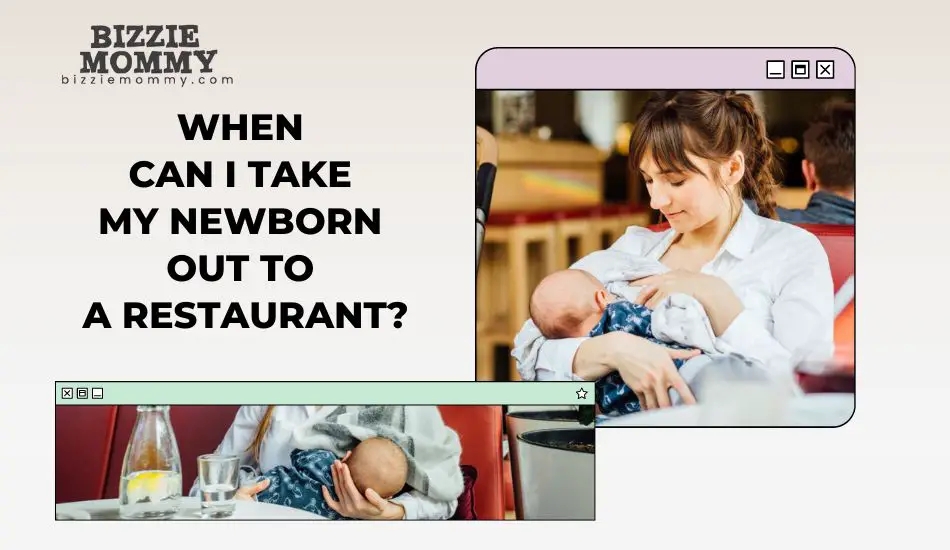Introducing your newborn baby to the world is an exciting experience, drawn by moments of joy, wonder, and a lot of caution. As a parent, every decision you make has a lot to do with consideration and protection for your child’s safety.
In this guide, we will delve into the factors to consider for a successful meal outing and expert advice to help you determine the right time to take your newborn out to a restaurant.
Talking your baby out in public is considered safe once your child is a few weeks old or you have completed all initial checkups and doctor visits.
But before taking this step, moms should also consider their baby’s health and prioritize the newborn’s immune system.
Choosing highly ventilated or fresh air areas, taking basic safety precautions, and spending quiet time would contribute to a child’s good hygiene practices and help minimize exposure to germs.
What To Consider When Taking A Newborn Out?
As parents, the journey of nurturing a newborn is a delicate balance of tender care and joyful exploration. After witnessing the moments of constant cuddles and sleepless nights, now is a time to include the enticing potential of sharing a meal at a restaurant.
Yet, it may seem like a simple endeavor but requires a lot to ensure both your little one’s happiness and your own peace of mind. From encouraging their delicate health to creating a soothing environment, this guide is a compass to guide the path of dining out with your special bundle of joy.
Here are several significant factors to consider before taking your newborn out:
Waiting For the First Few Weeks
In the nurturing journey of parenthood, the decision to wait for the first few weeks before taking your little one out in a public place is a testament to your unwavering commitment to their health and happiness.
Your doctor may advise you to wait a little and follow special medical needs as well because these initial weeks are a time of extraordinary growth and development.
This is a phase when your baby’s delicate immune system, learning and understanding your feeding session, and requires your dedicated attention and constant care.
By allowing your baby the time to establish essential routines, and feel ready to head out for the first time you lay the foundation for a smoother and more joyful dining experience when the moment is right.
As you wait, to take your baby out in crowded places you embrace the art of patience and preparations as a good mother, knowing that the path you tread today paves the way for delightful blessings to come. Your baby’s health, comfort, and well-being remain at the heart of every decision you make.
Monitoring Developmental Milestones
Monitoring developmental milestones in your child is a second essential factor in their growth and well-being. It involves tracking the advance of your baby’s overall behavior, various skills, and abilities that children typically achieve at specific ages. Here’s why and how you should monitor developmental milestones:
Why Paying Attention to Your Child’s Developmental Stages Is Key
Early Detection of Issues:
Early intervention is crucial for addressing issues on time and providing suitable support. Most doctors state that early monitoring prevents putting your child in any serious medical condition and leads to better outcomes in the long run.
Track Normal Progression:
If you are a mother or any family member, understanding typical developmental ways allows you to measure whether your child is progressing at a rate consistent with their age.
Customized Care:
If your child is seeing a doctor, early identification of challenges allows most pediatric health experts to design targeted strategies to support your child’s development.
Quick Guide: Monitoring Your Child’s Developmental Progress
CDC Milestone Monitoring
In order to monitor your child’s developmental milestones always go for reliable sources such as the Centers for Disease Control and Prevention (CDC), which provides comprehensive developmental milestone charts.
Progress Documentation
Try to document your kid’s progress in various areas such as motor skills, communication, cognitive abilities, problem-solving, memory, and social-emotional development.
Engaging Development
Always interact with your child through playing, conversation, and activities that encourage different aspects of development.
Healthcare Collaboration
If you notice something that doesn’t seem right, don’t hesitate to bring it up with your healthcare provider. If developmental delays or concerns are identified, early intervention services can provide specialized support tailored to your child’s needs.
How to Assess The Newborn’s Health and Immune System?

Assessing a newborn’s health and immune system involves a lot of consideration, careful observation, regular check-ups, and visionary measures to ensure your kid’s well-being.
Here’s how you can actually assess your newborn’s health and immune system:
- Pediatrician Visits:
Taking the baby to frequent doctors’ offices, having regular checkups, and visiting the pediatrician is key. These visits include thorough physical examinations, growth measurements, and discussions about your baby’s health and development.
- Observation:
It is crucial to pay close attention to your baby’s eating patterns, sleep rituals, and overall behavior. Any sudden changes in these factors could signal possible health concerns.
- Vaccinations:
Following the recommended vaccination schedule is mandatory for building your baby’s immune system and protecting them from diverse diseases.
- Breastfeeding:
Breastfeeding your baby in the initial stages is common sense and many doctors suggest moms continue to do so as breast milk can protect your child against infections and illnesses.
- Signs of Illness:
Try not to avoid exposing any signs of illness such as fever, stubborn crying, problem breathing, changes in skin color, or unusual inactivity. If you notice any concerning symptoms, contact your healthcare provider.
Remember, each baby is unique, and their health and immune system development can vary.
Precautions for Premature or Medically Fragile Newborns
Taking your newborn out in public requires special attention and sensitivity to ensure their well-being. Here are essential precautions to consider:
Strict Hygiene:
Create a habit of meticulous cleanliness and washing the baby’s hands frequently and ensure that anyone interacting with the baby follows the same protocol.
Limited Visitors:
Premature or medically fragile newborns are more sensitive to infections, so restrict meetings even young siblings, and limit exposure to individuals who might be sick.
Vaccinations:
In order to follow a precautionary plan ensure that everyone who interacts with the baby is up-to-date on vaccinations and flu shots.
Temperature Control:
Keep the baby in a warm and comfortable environment to prevent extreme weather fluctuations.
Cautious Outings:
Try to minimize trips to public places, especially crowded areas, until the baby’s immune system is stronger.
Avoid Smoke Exposure:
Keep the new baby away from smoke and tobacco, as smoking can have bad effects on respiratory issues and compromise babies’ fragile health.
Monitor for Signs of Illness:
Be alert for any signs of illness, such as fever, rapid breathing, difficulty feeding, lethargy, or unusual changes in behavior.
Safe Sleep Practices:
Follow safe sleep procedures to reduce the risk of Sudden Infant Death Syndrome (SIDS).
Educate Caregivers:
Inform caretakers, including family members and babysitters, about the baby’s specific needs since birth and follow precautions.
Choosing the Right Time and Place to Take Your Newborn Out to a Restaurant
Talking your baby out in public requires a lot of concentration and well-being practice. In order to achieve the best experience carefully consider these factors – quieter times, well-ventilated spaces, and restaurant hygiene. While ensuring this, you can make informed choices that contribute to a comfortable, enjoyable, and safe dining experience for both you and your newborn.
Opting for Quieter Times
When you are taking your baby out, you need to keep an eye on many things such as choosing the right place, comfortable clothes, and a ventilated area.
Here’s why and how you should consider quieter times:
Reasoning:
Choosing quieter times ensures the baby’s well-being because newborns are a little more sensitive during the initial stage, and they might find noise and crowds disturbing. Always make sure to use a stroller and bring back your baby’s serenity.
Benefits:
Opting for quieter times provides some well-deserved peace and a relaxed environment. This can be perfect for you and your little one to develop happy meal times and some quality time together.
Observation:
As we all know, being a mother is all about making sure your baby is going to enjoy the outing experience. Avoid making any last-minute plans and make a reservation instead, ask them to wash off any dirt and observe the restaurant.
Selecting Well-Ventilated Restaurants
Selecting high-ventilated restaurants should always be a priority for mothers. The reason behind taking a baby out is to enjoy a fulfilling experience instead of making things more difficult for a baby.
Here’s why it matters and what to look for:
Health Considerations:
Well-ventilated areas reduce the risk of baby trouble breathing and contribute to making the baby healthier by providing some fresh air and direct sunlight by sitting peacefully at a park bench. Choose comfortable baby clothing.
Open Spaces:
Apart from choosing ventilated areas, always opt for making open spaces areas your first priority. Outdoor sitting plus comfortable clothing provides excellent natural airflow and healthy ventilation and one could get to see beautiful natural views as well.
Air Conditioning and Filters:
If opting for open spaces isn’t possible, always try to be concerned about the air condition temperature and maintain systems in a way that doesn’t harm the baby.
Checking Restaurant Hygiene Standards
Talking your baby out in public? Always double-check cleaning and hygiene even when taking your newborn out to the restaurant.
Here’s how to assess restaurant hygiene:
Clean Restrooms: Make sure you use at clean and well-maintained restrooms, including clean tables or chairs, indicating the restaurant’s hygiene commitment.
Food Handling Practices: Inquire about the restaurant’s food handling practices and safety regulations if possible. Well-trained staff, clean surroundings, and proper food handling process contribute to making it a perfect place to go.
Online Reviews: Online reviews are the ultimate solutions and provide valuable insights for checking every detail and judging the place according to the visitor’s review and suggestions.
Conclusion
In the journey of parenthood, every decision is ingrained with care, deep consideration, and the constant desire to provide the best for your child. Taking your newborns out to a restaurant is a meaningful moment that blends careful preparation with the joy of sharing beautiful adventures together. As you begin this new chapter, remember that your baby’s health, comfort, and well-being remain the priority. Waiting for those first few weeks, observing developmental milestones, and ensuring a strong immune system are crucial steps in laying a foundation for a successful and enjoyable dining outing. Preparing for the experience by choosing quieter times, well-ventilated spaces, and hygienic restaurants reflects your dedication to creating a safe and comfortable environment for your baby.

